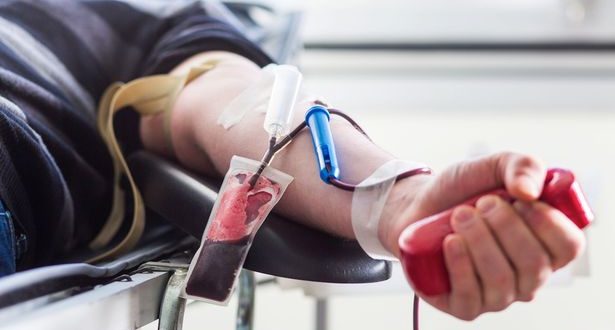Previously, men had to abstain from sex with other men for five years to give blood in Canada. On Monday, Canada’s health department released a statement saying it had accepted proposals from the country’s two blood agencies — Canadian Blood Services and Héma-Québec — to lower the ban to one year.
The change will take effect August 15 for both Canadian Blood Services, and Héma-Québec, and follows requests both organizations made to Health Canada back in March to change the wait period for men who have sex with men.
Canadian Blood Services said it needs to be “as minimally restrictive as possible, while also maintaining the safety of the blood supply.”
Health Minister Jane Philpott told reporters after a Monday end-of-session cabinet meeting that slackening the timeframe is a “step in the right direction.”
The reduction doesn’t go as far as a Liberal election campaign commitment to end the five-year ban, but she said that’s yet to come.
“There’s an incredible desire and commitment on our part of the government to further to decreasing that donor-deferral period,” she said, and added that the government wants to eventually move away from those kinds of bans.
“The desire is to be able to have those deferrals based on behaviour as opposed to sexual orientation.”
In a statement, Philpott said she recognizes it isn’t a “radical change,” and won’t affect many sexually active gay man currently barred from donating. But Philpott also said it’s just a matter of time before “any remaining barriers to MSM blood donation will be removed.”
“I would rather see Canada take a step in the right direction than stand still.”
Monday’s deferral period change comes at the same time as a $3 million funding announcement from Health Canada for Canadian Blood Services and Héma-Québec. That money is to be put toward behavioural research, organizing an international conference on blood donation policy, and developing new technology.
The change aligns Canada’s deferral period policy for gay men with the United States, England, France, Sweden, Australia, and New Zealand. Canada has had a 5-year wait period for gay men since 2013, after it lifted a nearly three-decades long ban on gay men donating blood in response to the HIV/AIDS crisis in the 1980s.
Canadian Blood Services also said Monday it’s currently looking into the possibility of moving toward behaviour-based screening.
Dr. Dana Devine, chief medical and scientific officer with Canadian Blood Services, said research focus is increasingly turning to “low risk” donors to try to expand the scope of who can donate, although they’re still at the “very beginning” of researching behavioural screening methods in Canada.
And, like, any other research project, there’s not a clear timeline on how long it will take before there are clear results that can translate into policy. That’s something that could take a few years, yet.
“We haven’t done this yet in Canada,” she said. “Our screening processes for blood donors are all pretty course filters. Are you in column ‘a’, or in column ‘b’?”
“They’re not sophisticated screening systems.”
The issue, though, is certainly on the radar for MPs. Not only did the Liberals campaign on it, the Commons Standing Committee on Health is likely to begin a study on it in the fall when Parliament returns.
Conservative MP Lenn Webber put forward a motion last week for the committee to study if the current restrictions can be reduced or eliminated while keeping the blood supply system safe, but the House adjourned before MPs could vote on it.
Agencies/Canadajournal
 Canada Journal – News of the World Articles and videos to bring you the biggest Canadian news stories from across the country every day
Canada Journal – News of the World Articles and videos to bring you the biggest Canadian news stories from across the country every day



